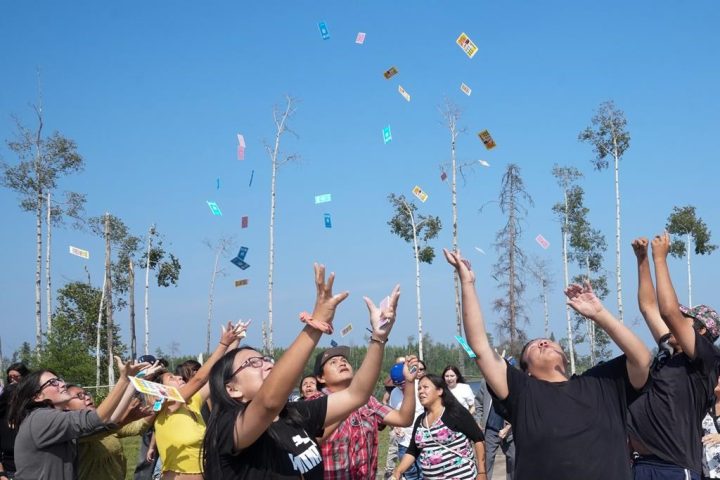A small northern Ontario First Nation has come together in its annual summer festival to both celebrate and rejuvenate its community.

The sun broke through the weeklong rain in Neskantaga First Nation on Friday, which allowed for canoe races, egg toss competitions, lottery draws and bingo games.
There was also a sardine eating competition and fresh-caught sturgeon.
The community flies in both Indigenous and non-Indigenous bands to perform — Trooper and Harlequin played in the local arena this week — and the festivities draw Neskantaga First Nation members home to the community of about 350 people.
The first nation, located about 450 kilometres from Thunder Bay, Ont., is only accessible by air and an ice road in the winter.
About 100 band members living off the reserve have returned home.
“Coming home means I can connect with my roots, I can visit my family, I can hear people speak the language more,” said Charla Moonias.
“When I’m in Thunder Bay, it’s just work, work, work. So when I’m here, I can breathe, I can enjoy nature, I can go on the boat, I can go fishing, I can just relax.”
The festival gives residents a chance to forget, even if only for a few minutes or hours, about a constant stress: clean water.
Neskantaga has the longest boil-water advisory in Canada, stretching back more than 28 years. The community, the federal government and various contractors continue to try to tackle a much-maligned water treatment facility.
Until it is fixed, the residents use bottled water for drinking, washing dishes and sometimes bathing — especially children.
In 2020, Neskantaga was evacuated over an oily sheen spotted in its reservoir. The sheen was later found to be mineral oil from a broken pump seal.
Suicide also remains an ever-present threat in the community.
The First Nation declared a state of emergency a decade ago over a rash of suicides and suicide attempts.
Like much of Ontario, the reserve is in a housing crisis. The community needs at least 100 more homes, leaving many families without adequate housing.
The summer festival, which is similar to others that are taking place in First Nations across Ontario, allows residents a break from the hardships the community has faced over the years, said Chief Chris Moonias.
“It’s a time to come together and it’s a time to celebrate and it’s a time to forget the problems and forget the issues we face,” he said. “And it’s good to remember that life is worth living, we deserve to have some fun.”
Sol Mamakwa, the New Democrat provincial legislator for the Kiiwetinoong riding where Neskantaga is located, visited the village for a few days to check in.
“It’s good to be here when Neskantaga is not in crisis,” said Mamakwa.
“These festivals are so important because it gives people something to look forward to.”
Kendra Moonias loves this time of year. The 15-year-old relishes the non-stop community activities.
“How I see it is this is the only time the whole community gathers together instead of gathering at a funeral,” she said. “And it’s all about the fun and about being together.”
Also on offer: fresh sturgeon. Kue Wapoose caught eight sturgeon in the nearby Attawapiskat River and boiled the fish up over a fire on the shore.
“It’s a real delicacy and it’s an honour to make it for the community,” he said.



Comments